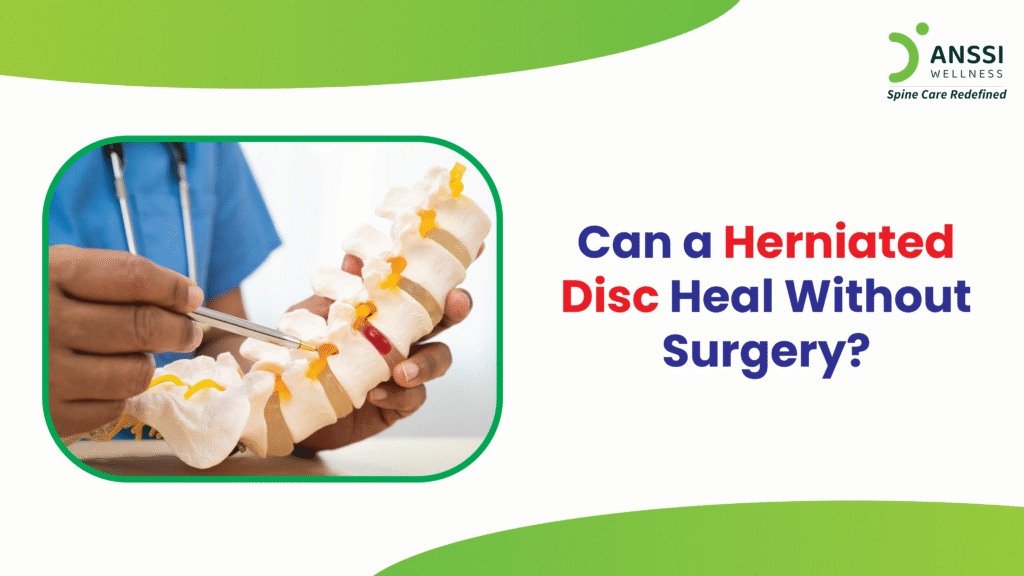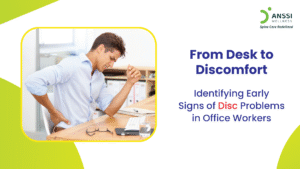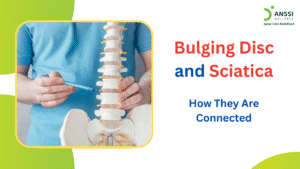A herniated disc, also known as a slipped or ruptured disc, is one of the most common causes of neck or back pain. It occurs when the soft inner portion of a spinal disc pushes through a tear in the tougher outer layer, potentially pressing on nearby nerves. The back, arms, or legs may experience pain, numbness, tingling, and weakness as a result of this pressure.
While the idea of surgery might seem inevitable to many, the encouraging truth is that a herniated disc can often heal without surgical intervention. Let’s explore how.
Understanding Herniated Disc
Our spine is composed of vertebrae separated by soft, gel-like discs that act as shock absorbers. These discs allow flexibility and support the spine during movement.
A herniated disc happens when part of the disc’s inner gel leaks out due to injury, overuse, or degeneration. When this protruding material presses against spinal nerves, it can trigger sharp pain or radiating discomfort.
Common symptoms of a herniated disc include:
- Localised pain in the neck or back
- Radiating pain in the arm or leg (depending on disc location)
- Numbness or tingling in extremities
- Muscle weakness
Can a Herniated Disc Heal Naturally?
Yes, in many cases, a herniated disc can heal without the need for surgery. The human body has a remarkable ability to repair itself. Over time, the disc material may shrink, reabsorb, or stop irritating the nerve, reducing symptoms significantly.
Most people begin to feel better within a few weeks to a few months with proper care. The natural healing process depends on several factors, including:
- The severity and location of the herniation
- The person’s age and overall health
- Daily activity level and posture
- Commitment to recommended therapies
Non-Surgical Treatment Options
For those looking to avoid surgery, several effective non-surgical treatments can reduce pain, support healing, and restore function.
1. Physiotherapy
A physiotherapist will guide you through customised exercises to strengthen the muscles around the spine, correct posture, and improve flexibility. This reduces the strain on the disc and helps prevent future problems.
2. Non-Surgical Spinal Decompression Treatment
This non-surgical treatment uses a specialised table to gently stretch the spine and relieve pressure on the discs and nerves. Spinal decompression has shown excellent results for herniated disc patients, providing long-term relief.
3. Pain Management
Simple pain relief methods such as hot and cold therapy, gentle massage, and electrical stimulation (TENS) can provide relief. In some cases, a doctor may recommend temporary use of anti-inflammatory medication.
4. Lifestyle Modifications
Making small changes in your daily routine can accelerate healing:
- Maintain a healthy weight to reduce spinal stress.
- Avoid heavy lifting or sudden twisting movements.
- Use proper ergonomics at your workstation.
- Sleep on a supportive mattress and avoid poor sleeping positions.
These steps not only help in recovery but also prevent future disc issues.
Recommended Exercises
Regular, gentle exercises play a key role in recovery. These movements help improve flexibility, stabilise the spine, and reduce nerve pressure. Here are a few that are commonly recommended:
- Pelvic Tilts: With your feet flat and knees bent, lie on your back. Flatten your back against the floor by contracting your abdominal muscles. Hold for a few seconds and release.
- Hamstring Stretches: Stretching the muscles at the back of your thigh can ease lower back stress.
- Bird Dog Exercise: Strengthen your abdominal and back muscles to support the spine more effectively. In the tabletop position, extend your left arm forward while stretching your right leg backwards. Alternate with other limbs.
- Neck and Shoulder Rolls: If your herniated disc is in the cervical (neck) region, these gentle movements can help release tension and improve range of motion.
Note: Always perform exercises under professional guidance. Improper technique can worsen symptoms.
When to Consider Professional Help
While many cases improve with self-care and non-invasive therapies, it’s important to recognise when medical help is necessary. You should consult a spine specialist if:
- Pain persists or worsens despite rest and therapy.
- You experience significant numbness or weakness.
- You have trouble walking or maintaining balance.
- You develop bladder or bowel dysfunction.
Early diagnosis and expert guidance can prevent complications and ensure a faster, more effective recovery.
About ANSSI:
ANSSI Wellness focuses on improving the quality of life for patients suffering from spinal issues, aiming to provide relief where other conventional treatments have failed. Through advanced non-surgical spinal decompression treatment, ANSSI is committed to helping patients avoid surgery and recover in a safe, effective, and compassionate environment.
Connect with ANSSI Wellness on LinkedIn, Instagram, and Facebook for expert guidance.



